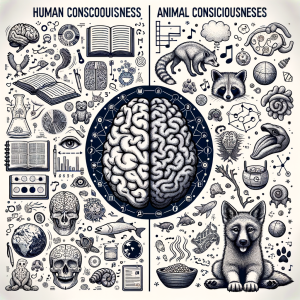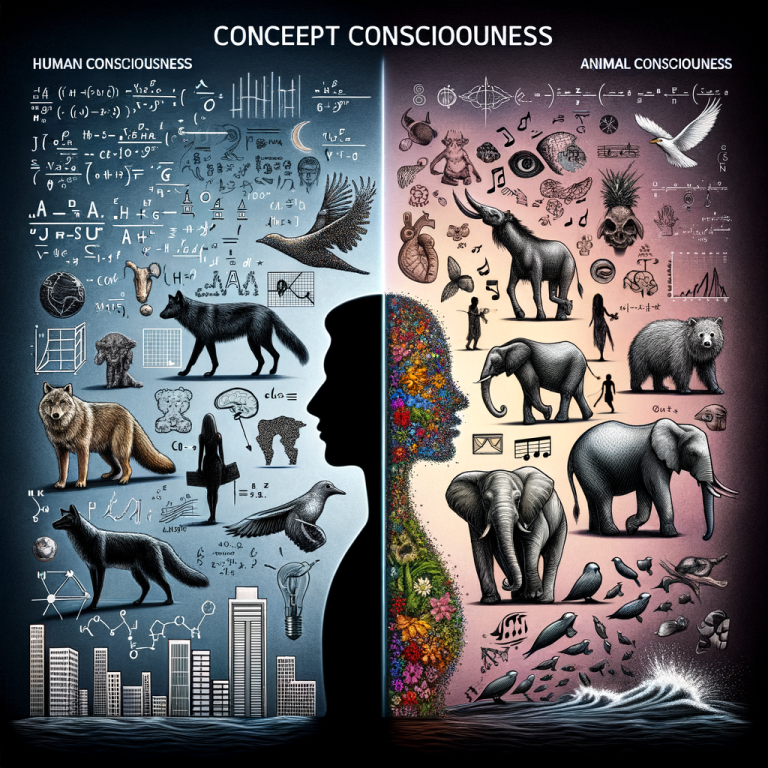Understanding the Difference
Exploring the contrast between human consciousness and animal consciousness is crucial for understanding our place in the world. From cognitive abilities to communication, the differences between the two are vast and fascinating. It’s essential to respect and appreciate these disparities in order to coexist harmoniously with our fellow beings.
Comparing Human and Animal Size and Strength
Discover how the weight and height of humans stack up against different animals, buildings, and objects. You’ll be amazed at the surprising comparisons and gain a new perspective on the world around you.
Characteristics of Human Consciousness
Human consciousness is characterized by several key features that distinguish it from animal consciousness. These include:
- Cognitive abilities: Humans possess advanced cognitive abilities, including reasoning, problem-solving, and abstract thinking, which are not as developed in animals.
- Self-awareness: Humans have a high level of self-awareness, understanding their own existence and individuality, while animals may not have the same level of self-awareness.
- Language and communication: Humans have complex language systems and the ability to communicate through spoken and written language, allowing for the expression of complex thoughts and ideas.
Differences between Human and Animal Consciousness
One of the key differences between human consciousness and animal consciousness lies in the level of self-awareness. While humans have a high level of self-awareness, animals may not possess the same level of understanding of their own existence and individuality. This distinction has significant implications for how humans interact with and understand animals.
Characteristics of Animal Consciousness
When comparing human consciousness and animal consciousness, it is important to consider the distinct characteristics of animal consciousness that set it apart from human consciousness.
Cognitive Abilities
Animals possess cognitive abilities that allow them to learn, problem-solve, and adapt to their environments. While these abilities may differ from those of humans, they demonstrate a level of consciousness that is unique to the animal kingdom.
Self-Awareness (or lack thereof)
While some animals have shown signs of self-awareness, such as recognizing themselves in a mirror, it is not as prevalent as in humans. This difference in self-awareness is a key factor in understanding the distinctions between human and animal consciousness.
Communication and Social Behaviors
Animals communicate and engage in social behaviors that are essential for their survival and well-being. These behaviors may vary across species, but they play a crucial role in understanding the complexity of animal consciousness.
By examining these characteristics, we can gain a deeper understanding of the differences between human consciousness and animal consciousness. This understanding is essential for informing ethical considerations in scientific research, conservation efforts, and the treatment of animals.
Comparison of Human and Animal Consciousness
When comparing human consciousness and animal consciousness, several key differences become apparent, shedding light on the unique characteristics of each.
Differences in Cognitive Abilities
Human cognitive abilities, such as problem-solving, abstract thinking, and complex reasoning, are highly developed and allow for advanced technological and scientific advancements. On the other hand, animal cognitive abilities, while impressive in their own right, may not reach the same level of complexity and depth as human cognition.
Variances in Self-Awareness
Human self-awareness encompasses a deep understanding of oneself, including introspection and awareness of one’s own thoughts and emotions. This level of self-awareness may not be as pronounced in animals, although some species have shown signs of self-recognition and self-awareness to varying degrees.
Distinctions in Communication and Social Behaviors
Human language and communication are highly sophisticated, allowing for complex expression and the transmission of intricate ideas. In contrast, animal communication and social behaviors may be more instinctual and based on non-verbal cues, although some species exhibit remarkable social structures and communication systems.
By understanding and respecting these differences between human and animal consciousness, we can gain a deeper appreciation for the diversity of life on Earth and the unique qualities that define each species.
 Ethical Implications
Ethical Implications
Understanding the difference between human consciousness and animal consciousness has significant ethical implications, particularly in the way we treat animals and the impact on conservation efforts. It also raises ethical considerations in scientific research.
Considerations for the Treatment of Animals
The recognition of the difference between human and animal consciousness should lead to a reevaluation of the treatment of animals. This includes ethical considerations in areas such as animal testing, farming practices, and the use of animals in entertainment. Acknowledging the differences in consciousness should prompt a more compassionate and respectful approach to the treatment of animals.
Impact on Conservation Efforts
Understanding the differences in consciousness between humans and animals can also impact conservation efforts. It highlights the importance of preserving natural habitats and protecting endangered species, recognizing that animals have their own unique experiences and consciousness that deserve respect and consideration.
Ethical Considerations in Scientific Research
The ethical implications of the differences in consciousness extend to scientific research involving animals. Researchers and institutions must consider the ethical implications of their work, ensuring that the treatment of animals in research is conducted with respect and consideration for their consciousness and well-being.
Conclusion
Understanding the differences between human consciousness and animal consciousness is crucial for various reasons. It allows us to appreciate the unique characteristics and behaviors of both humans and animals, leading to a greater understanding and respect for all forms of life on our planet.
By recognizing the differences between human and animal consciousness, we can:
- Develop a deeper appreciation for the cognitive abilities of both humans and animals, acknowledging the unique strengths and capabilities of each.
- Respect the variances in self-awareness, understanding that humans and animals may perceive themselves and their surroundings in different ways.
- Recognize the distinctions in communication and social behaviors, leading to more effective and empathetic interactions with animals.
Ultimately, understanding and respecting the differences between human and animal consciousness can lead to more ethical treatment of animals, informed conservation efforts, and responsible scientific research practices. It is essential to approach these considerations with an open mind and a willingness to learn from the complexities of consciousness in both humans and animals.


Comments are closed.